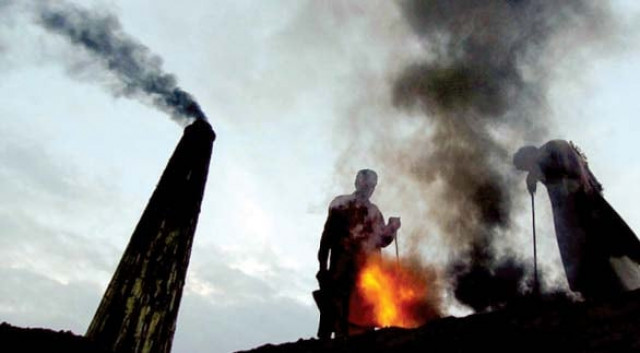Just breathe...: For entire Punjab, one unit to monitor air quality
Government finally presents environment protection policy in court.

PHOTO: FILE
The Environmental Protection Agency (EPA) has only one operational ambient air quality monitoring system, which was purchased in December 2016. Whereas, New Delhi alone has six air quality monitoring stations.
This was revealed in the draft of the environmental protection policy presented by the Punjab government before Lahore High Court Chief Justice Syed Mansoor Ali Shah on Monday.
The top judge had ordered the government to submit its pollution control policy on the petition of Advocate Sheraz Zaka.
The petition stated one of the major constraints was the lack of an efficient programme. There was a need to regularly monitor air quality through 30 stations in at least eight large cities.
The policy document stated about Rs600 million were needed to establish such a system along with Rs20 million for annual repairs. One of the major causes of air pollution and smog in the country was the use of high-sulphur fuels.
These fuels contribute to emission particulate matter (pm) and sulphur dioxide (SO2) emissions, which are hazardous for humans.
According to the relevant law, the sulphur content allowed in fuels used in the country is 500 parts per million (ppm), but it exceeds 10,000 ppm while low-sulphur fuels are being used in most South Asian countries.
Ultralow sulphur fuel with content below 50 ppm is being used in New Delhi, said the policy. The use of high sulphur-carrying fuels was to be reduced to 500 ppm by 2008, but the plan was postponed till 2010 and again till 2012.
The deadline for introducing low-sulphur fuel was finally extended to 2017, the policy said. The federal government was asked to ensure the implementation of a clean fuel regime by the deadline.
The document, which was signed by environment secretary Saif Anjum, was prepared after consultations with Suparco General Manager Arifa Lodhi and FC College Department of Environmental Sciences Chairman Dr Ishtiaq Ahmed Qazi.
The document said dust from road shoulders was an important cause of particulate pollution of ambient air. Industrial units located in urban areas must be shifted to specified zones, it recommended. “Smog, being a regional problem, cannot be controlled by the country alone, but the federal government must put environmental concerns on the agenda of bilateral and multilateral dialogues between Pakistan and India.”
The policy added that trees, being an important source production of oxygen and moisture, must be planted.
“Burning of municipal waste and crop residue is also a must,” it suggested, adding better traffic management and adopting Euro-II stardards of vehicle emission.
The policy document also suggested that catalytic converters should be installed on motor vehicles to reduce harmful emissions to simpler, harmless forms. After seeing the report, the CJ appreciated the government and put off the hearing till April 24.
The court also asked the government to apprise the court about the fate of contractual employees of the EPA on next hearing. The court also ordered to consolidate all related matters.
Published in The Express Tribune, April 11th, 2017.



















COMMENTS
Comments are moderated and generally will be posted if they are on-topic and not abusive.
For more information, please see our Comments FAQ